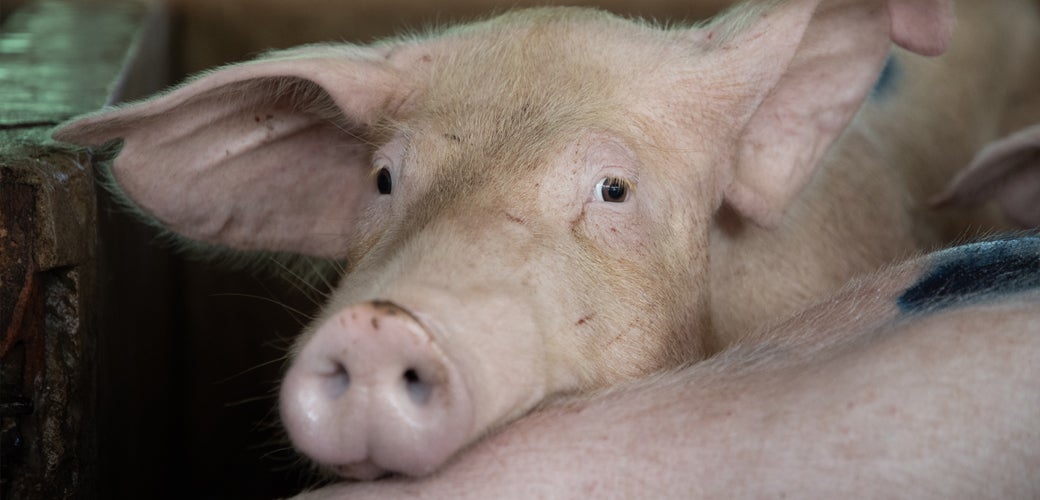Humane Slaughter Violation at Iowa Plant Increases Concerns about Extreme-Speed Slaughter

- The Humane Methods of Slaughter Act, a federal law dating back to 1958, requires that pigs and some other types of farm animals are “rendered insensible to pain” prior to slaughter.
- On September 1, 2020, a slaughterhouse in Ottumwa, Iowa, sent a pig into a tank of scalding hot water while the pig was still conscious.
- As authorized by law, the U.S. Department of Agriculture (USDA) suspended activities at the plant for this egregious violation of the Humane Methods of Slaughter Act, requiring the company to take corrective actions before resuming slaughter operations.
- We’re horrified by this incident and distressed by the industry’s tone-deaf efforts to further increase line speeds and ramp up production in the face of appalling abuses against animals and workers in the midst of a pandemic.
- You can help alleviate some of the unnecessary suffering of farm animals during the pandemic by urging your lawmakers to support the Safe Line Speeds in COVID-19 Act.
The Humane Methods of Slaughter Act (HMSA) is one of the only federal laws that outlines protections for farm animals. Violations like the recent incident in Ottumwa, Iowa, illustrate the risks inherent in slaughter systems where line speeds already run dangerously fast—jeopardizing the welfare and safety of farm animals and plant workers—and increase concerns about the USDA allowing extreme-speed slaughter systems where the lines move even faster.
The JBS* Ottumwa plant failed to properly render a pig unconscious during the stunning stage—HMSA’s foundational requirement, which decreases pain and suffering for farm animals during slaughter. As a result of this error, the pig entered a scalding tank—a tank of extremely hot water used to loosen hair from an animal’s skin—while still conscious, in violation of federal law, causing her to suffer unimaginable pain and terror.
If the stunning device is not properly applied for an adequate period of time, an animal may regain consciousness before they are slaughtered. While the meager documentation available to the public doesn’t tell the full story, it seems that insufficient stunning time could have played a role in this incident.
This most recent scalding of a conscious animal adds to the growing evidence demonstrating that plants already struggle to comply with humane slaughter and handling laws. Time constraints and pressures to keep systems moving quickly are already problematic. Now, with the COVID-19 pandemic, plants are continually failing to implement proper safety protocols, workers and inspectors are getting sick and dying, plants are short-staffed or closed, and producers are unable to move the large numbers of animals they raise to slaughter on time—resulting in “depopulation” or mass, inhumane killings of these animals.
It is obvious that the only appropriate policy is for the USDA to slow down line speeds—not speed them up or eliminate all restrictions on speed whatsoever. Slaughterhouses are facing increased pressure during the pandemic due to the inherent fractures in our underlying factory farming system. The challenges slaughterhouses are facing will only be exacerbated if the government continues to irresponsibly allow slaughterhouses to operate at breakneck-speeds—an approach that only increases the likelihood of humane slaughter violations, worker injuries and illness, and food safety violations.
You can make a big difference for farm animals by urging your U.S. senators and representative to support the Safe Line Speeds in COVID-19 Act.
*JBS® USA is a leading processor of beef and pork in the U.S. and a leading processor of beef in Canada. It is also a majority shareholder of Pilgrim’s Pride Corporation, the second largest poultry company in the U.S., with operations in the U.S. and Mexico. (Source)
Source: Read Full Article


